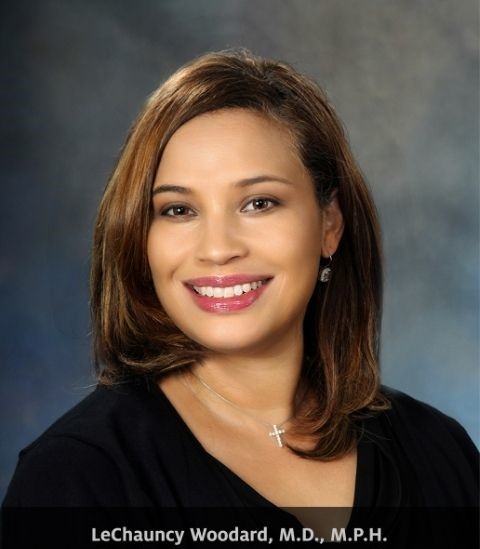
LeChauncy Woodard, M.D., M.P.H., a University of Houston College of Medicine professor and a general internist, was recently named a 2020 Laureate by the Texas Chapter of the American College of Physicians (ACP). The award honors fellows and masters of ACP who have demonstrated a commitment to excellence in medical care, education, research, and service to their communities, chapter, and college.
“This award reflects not only my individual accomplishments but also the dedication and generosity of my mentors and colleagues and the trust of my patients and students,” Woodard said. “This acknowledgement is especially meaningful because it also highlights the tremendous work that we are doing at the University of Houston College of Medicine to increase representation in medicine and fill the void of primary care physicians in Texas.”
Woodard is the founding director of the Humana Integrated Health System Sciences Institute at the University of Houston (Humana Institute) at UH. The Humana Institute brings together the health professions schools at the University of Houston to advance the next generation of health professionals through interdisciplinary training focusing on social needs, risk factors and determinants of health, and expanded use of value-based payment models.
In addition to her work with the Institute, Woodard is nationally recognized for her extensive research focused on performance measurement and improving quality of care for chronically ill, multimorbid adults through team-based behavioral health interventions to enhance collaborative goal setting. She has experience in interprofessional team-based care, quality improvement, and patient safety. She is also an adjunct faculty member at Baylor College of Medicine and the Center for Innovations in Quality, Effectiveness, and Safety, where she served as principal investigator on several federally funded grants. Her accomplishments include leading the Houston VA Center of Excellence in Primary Care Education, an interprofessional training program that integrates trainees from medicine, mental health, nursing, social work, and pharmacy to care for high-complexity Veteran patients.
“My research allows me to study issues that affect patients’ health and quality of life,” she said. “It makes me a better clinician, allows me to learn how we can provide better care to improve the health of the populations that we serve.”
Throughout the COVID-19 pandemic, Woodard has been engaged in helping to address community needs through her work with UH colleagues to develop contact tracing courses that have enrolled more than 20,000 learners collectively as well as participating as a collaborator in the National Institutes of Health (NIH) Community Engagement Alliance (CEAL) against COVID-19. She has shared her work in a variety of forums including peer-reviewed presentations and workshops, radio, podcasts, and medical journals with more than 40 publications.
Woodard earned a Bachelor of Arts degree from Texas A&M University and her medical degree from the University of Texas Medical Branch at Galveston. She completed her internal medicine residency training and fellowship in primary care research at Baylor College of Medicine. During her fellowship, she earned a Master of Public Health degree from the University of Texas Health Science Center at Houston.